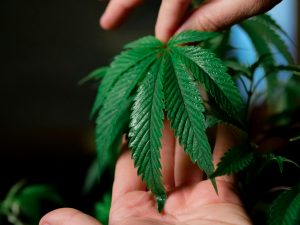Go to Page Section:
The debate around cannabis often centers on its two most prominent compounds: THC and CBD.
Both substances come from the cannabis plant but have distinct legal and physiological profiles.

This article clarifies the legal differences between THC and CBD, explaining what sets them apart and why those differences matter.
What Are THC and CBD?
THC, or tetrahydrocannabinol, is known for its psychoactive effects, producing the “high” associated with marijuana.
In contrast, CBD, or cannabidiol, does not have psychoactive properties and is popular for its potential therapeutic benefits, such as reducing anxiety and inflammation.
Although both compounds share a similar chemical structure, their actions in the body differ, which influences their separate regulatory paths.
Legal Status in the United States
The legal landscape for THC and CBD is complex and varies by state and federal jurisdiction.
THC is classified as a Schedule I substance under the Controlled Substances Act, indicating a high potential for abuse and no recognized medical use at the federal level.
Many states have legalized THC for either medicinal or recreational use, creating a patchwork of regulations across the country.
CBD derived from hemp became federally legal with the 2018 Farm Bill, which removed hemp from the Controlled Substances Act provided it contains no more than 0.3% THC.
Despite this federal stance, some states have imposed restrictions on CBD products, particularly on food, beverages, and supplements.
Key Points on Federal Legal Status of THC vs. CBD
THC:
- Federal Classification: Schedule I (Controlled)
- Key Requirements: Recognized as having a high potential for abuse; no accepted medical use federally; state laws vary.
CBD (from hemp):
- Federal Classification: Legal (with conditions)
- Key Requirements: Must contain less than 0.3% THC; state-specific restrictions may apply.
These points highlight the primary distinctions in federal treatment.
Given that state laws can add additional complexities, it is essential to verify local regulations before purchasing or selling these products.
International Perspectives
The legal status of THC (via Crescent Canna) and CBD varies significantly worldwide.
Some countries enforce stricter controls on both compounds, while others have moved toward decriminalization or full legalization.
For instance, several European countries allow the medical use of both THC and CBD under strict conditions, whereas others maintain stringent prohibitions.
To avoid legal complications, consumers traveling internationally or engaging in cross-border commerce should carefully review local laws.
Medical and Recreational Use
The legal differences between THC and CBD affect their availability for medical or recreational use.
In states where recreational cannabis is legal, THC products are sold in licensed dispensaries that follow state regulations regarding product quality, labeling, and testing.
CBD products, on the other hand, are more widely available in health stores and online.
Although marketed for a range of potential benefits, CBD products must be verified for THC content and overall compliance with the law.
Business and Regulatory Challenges
The differing legal statuses of THC and CBD create unique challenges for businesses.
Companies must navigate a regulatory environment that includes federal, state, and local laws, requiring constant vigilance and adaptation.
For example, a business in a state with legalized recreational marijuana must manage strict testing and labeling protocols for THC products.
Conversely, companies selling CBD products need to ensure their items remain below the 0.3% THC threshold, influencing product development, marketing, and distribution strategies.
Impact on Research
Legal restrictions on THC have historically limited scientific research, as its Schedule I classification requires researchers to obtain special licenses and permits.
This limitation has slowed progress in understanding the full range of THC’s potential benefits and risks.
Research on CBD has advanced more quickly since its federal legalization under the 2018 Farm Bill, though regulatory uncertainty still complicates funding and research efforts.
Evolving laws may eventually provide broader opportunities for comprehensive studies on both compounds.
Consumers should be mindful of the legal distinctions between THC and CBD, particularly when traveling or making online purchases.
Researching local laws before using or purchasing these products helps prevent unintentional violations and ensures compliance with legal standards.
Reviewing product labels and third-party lab test results is essential, as well as offering detailed information on THC content and purity.
Future Legal Trends
The regulatory landscape for both THC and CBD is likely to evolve as public opinion and scientific research develop.
Many state laws are trending toward the relaxation of cannabis restrictions, and there is potential for changes at the federal level as well.
Policymakers carefully balance public health, consumer safety, and economic opportunities when considering new regulations.
Although the legal differences between THC and CBD may narrow, significant distinctions are expected to persist, requiring consumers and businesses to stay informed about regulatory updates.


Leave a Reply